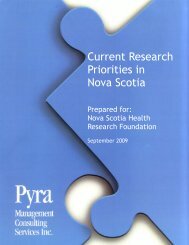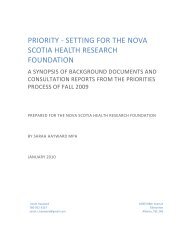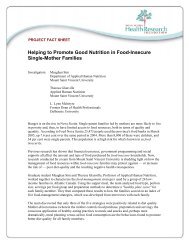Major Health Issues in Nova Scotia: An Environmental Scan
Major Health Issues in Nova Scotia: An Environmental Scan
Major Health Issues in Nova Scotia: An Environmental Scan
Create successful ePaper yourself
Turn your PDF publications into a flip-book with our unique Google optimized e-Paper software.
# Reference Brief Notes<br />
professionals. Home <strong>Health</strong>c.Nurse; 2008;<br />
26(4):222-9.<br />
management fits with<strong>in</strong> the purview of home healthcare and should<br />
be central to home health chronic care delivery. <strong>An</strong> expanded Home-<br />
Based Chronic Care Model (HBCCM) is described that builds on<br />
Wagner's model and <strong>in</strong>tegrates salient theories from fields beyond<br />
medic<strong>in</strong>e. The expanded model maximizes the potential for disease<br />
self-management success and is <strong>in</strong>tended to provide a foundation for<br />
41. Taylor,SJ, Candy,B, Bryar,RM, et al.<br />
Effectiveness of <strong>in</strong>novations <strong>in</strong> nurse led<br />
chronic disease management for patients<br />
with chronic obstructive pulmonary disease:<br />
Systematic review of evidence. BMJ; 2005;<br />
331(7515):485.<br />
42. Tsai,AC, Morton,SC, Mangione,CM, et al. A<br />
meta-analysis of <strong>in</strong>terventions to improve<br />
care for chronic illnesses. Am.J.Manag.Care;<br />
2005; 11(8):478-88.<br />
43. Wagner,EH, Bennett,SM, Aust<strong>in</strong>,BT, et al.<br />
F<strong>in</strong>d<strong>in</strong>g common ground: Patientcenteredness<br />
and evidence-based chronic<br />
illness care. J.Altern.Complement.Med.; 2005; 11<br />
Suppl 1:S7-15.<br />
44. Warm,EJ. Diabetes and the chronic care<br />
model: A review. Curr.Diabetes Rev.; 2007;<br />
3(4):219-25.<br />
45. Waters,D and Sierp<strong>in</strong>a,VS. Goal-directed<br />
health care and the chronic pa<strong>in</strong> patient: A<br />
new vision of the heal<strong>in</strong>g encounter. Pa<strong>in</strong><br />
Physician.; 2006; 9(4):353-60.<br />
home health's <strong>in</strong>tegral role <strong>in</strong> chronic disease management.<br />
This study’s objective was to determ<strong>in</strong>e the effectiveness of<br />
<strong>in</strong>novations <strong>in</strong> management of chronic disease <strong>in</strong>volv<strong>in</strong>g nurses for<br />
patients with chronic obstructive pulmonary disease The authors’<br />
conclude that there is little evidence to date to support the<br />
widespread implementation of nurse led management <strong>in</strong>terventions<br />
for COPD, but the data are too sparse to exclude any cl<strong>in</strong>ically<br />
relevant benefit or harm aris<strong>in</strong>g from such <strong>in</strong>terventions.<br />
This study exam<strong>in</strong>ed the follow<strong>in</strong>g questions: (1) Do <strong>in</strong>terventions<br />
that <strong>in</strong>corporate at least 1 element of the Chronic Care Model (CCM)<br />
result <strong>in</strong> improved outcomes for specific chronic illnesses? (2) Are<br />
any elements essential for improved outcomes? The authors’<br />
conclude that <strong>in</strong>terventions that conta<strong>in</strong> at least 1 CCM element<br />
improve cl<strong>in</strong>ical outcomes and processes of care--and to a lesser<br />
extent, quality of life--for patients with chronic illnesses.<br />
<strong>Health</strong> outcomes for patients with major chronic illnesses depend on<br />
the appropriate use of proven pharmaceuticals and other therapeutic<br />
technologies, and effective self-management by patients. Effective<br />
chronic illness care then bases cl<strong>in</strong>ical decisions on the best, rigorous<br />
scientific evidence, or evidence-based medic<strong>in</strong>e. The Chronic Care<br />
Model is a compilation of those practice system changes shown to<br />
improve chronic care. This paper explores the concept of patientcenteredness<br />
and its relationship to the Chronic Care Model. We<br />
conclude that the Model is both evidence-based and patient-centered<br />
and that these can be properties of health systems, and not just of<br />
<strong>in</strong>dividual practitioners.<br />
There is a significant gap between evidence-based diabetes care and<br />
actual care delivery. The Chronic Care Model (CCM) was developed<br />
to bridge this gap and translate scientific knowledge directly to the<br />
care of patients. This review will describe the elements of the CCM<br />
Model and provide evidence for their use <strong>in</strong> improv<strong>in</strong>g diabetes care.<br />
Evidence for the CCM as a whole will also be presented.<br />
The authors of this article <strong>in</strong>troduce a new way to engage the patient<br />
with chronic pa<strong>in</strong>, Goal-Directed <strong>Health</strong> Care (G-DHC). Identify<strong>in</strong>g<br />
the patient's major life goals dur<strong>in</strong>g the medical <strong>in</strong>terview is the key<br />
element of this approach along with connect<strong>in</strong>g these life goals to<br />
specific health-related goals. The authors anticipate such a model of<br />
patient-centered care will shift the dynamic of the medical encounter<br />
with the patient with chronic pa<strong>in</strong> to one that is ultimately more<br />
productive and satisfy<strong>in</strong>g for both patient and physician. Illustrations<br />
of cases, questions to ask patients, and a detail of the process may<br />
allow the reader to adopt this method <strong>in</strong>to their practice.<br />
46. Watk<strong>in</strong>s,K, P<strong>in</strong>cus,HA, Tanielian,TL, et al.<br />
Us<strong>in</strong>g the chronic care model to improve<br />
treatment of alcohol use disorders <strong>in</strong> primary<br />
care sett<strong>in</strong>gs. J.Stud.Alcohol; 2003; 64(2):209-<br />
18.<br />
Alcohol use disorders (AUDs) are serious and often chronic medical<br />
conditions that present a significant public health concern. The<br />
authors describe the Chronic Care Model (CCM) and discuss ways it<br />
can be adapted <strong>in</strong> primary care sett<strong>in</strong>gs to improve care for AUDs.<br />
Further work is needed on develop<strong>in</strong>g tools, self-management<br />
support resources and tra<strong>in</strong><strong>in</strong>g strategies before the CCM can be<br />
evaluated <strong>in</strong> real world sett<strong>in</strong>gs.<br />
47. Willison,KD, Williams,P and <strong>An</strong>drews,GJ. This paper highlights three selected issues and potential strategies











